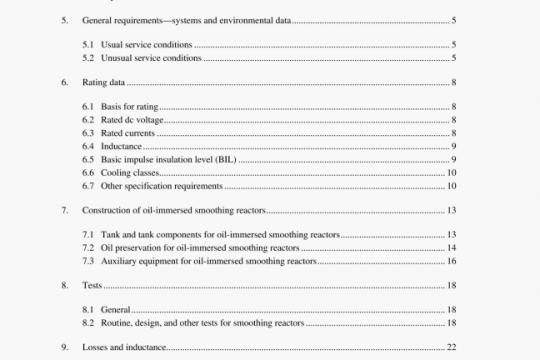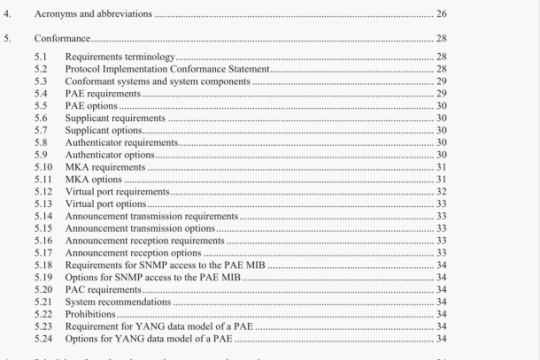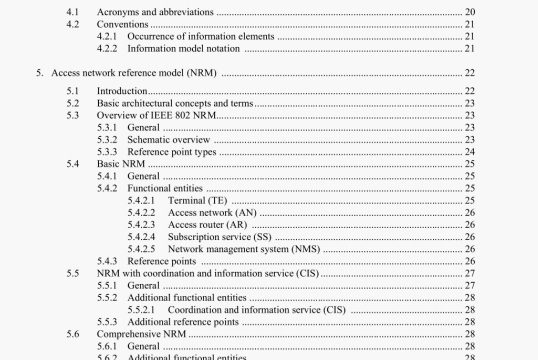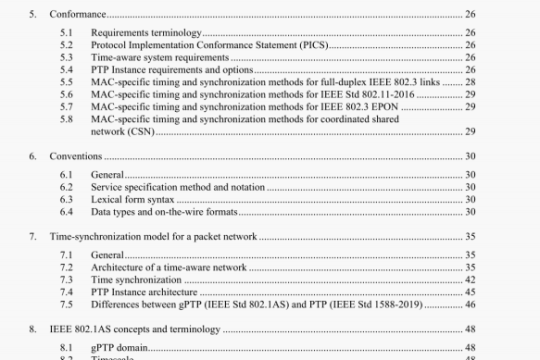IEEE 1636.2-2010 pdf download
IEEE 1636.2-2010 pdf download.IEEE Trial-Use Standard for Software Interface for Maintenance Information Collection and Analysis (SIMICA):Exchanging Maintenance Action Information via the Extensible Markup Language(XML).
5. Conformance
The minimal expcetat.ons for MAI-conlonmint XML instance documents shall be that the instance document is considered valid if said document complies with the constraints expressed in the MAI and SIMI(A Common schcmas and intbnnation models (sec Anncx A and Anncx C).
6. ExtensibIlity
The provision of an cxlcnsion mechanism is necessary to ensure the viability of the spccitkalion and allow producers and consumers of SIMICA instance documents to inleroperate in those cases where there is a requirement to exchange releant data that is not included in the trial-use standard XML scheina The use of the extensions shall be done in a way that ensures that a conformant consumer can utilize the extended file without error. discard or otherwise sidestep the extended data, and usc the non-extended portions of the data as it is intended—without error or kss of functionality.
FLxtcnsions shall be additional int’onnation added to the contem model of the clement being extended
lxtensions shall not repackage existing inftrmation entities that arc already supported by the trial-usc standard.
An extended instance document shall he accompanied by the extension XML schema and documentation sufficient to explain the need for the extension as well as the underlying semantics and relationship4s) to thc base schema.
MAI schemas support two forms of extension, as follows:
a) Wildcard-bascd extensions allow for the extension of SIMICA schemas with additional elements.
b) Type dens atiun allows for extending the set of data types by dens ing a new type from an existing type.
XML schemas control the location and type of extension allowed,
An element has an extensible content model if in instance documents that element can contain elements and data beyond that specified by the schema. SIMICA schemas should explicitly identit, where they can be extended. Only elements from a namespace different from the document namespacc should be allowed in an extension. The schema shall use the SimicaCommon
Allowing the extension of a schema using type substitution should be avoided. Schemas should mark elements defined via a simple or complex type with the block attribute set to #all if type substitution is to be avoided. Elements that use type substitution as their means of definition should set the abstract attribute to true.
B.1.2.2.2 Child elements
The c:DocunientList complex-type child element is contained in IEEE Std 1671-2006, Annex B.
B.1.2.3 c:DocumentReference
When present, the c:DocumentRefi?rence complex type shall he the base type for any schema element that will identify an external document.
B.1.2.3.1 Attributes
The c:DocumentRefi’rence complex-type attributes are contained in IEEE Std 1671-2006, Annex B.
B.1.2.3.2 Child elements
The c:DocunientRe/erence complex type contains no child elements.
B.1.2.4 c:Extension
The Extension complex type is provided for the convenience of schema developers. The Exten.sion type shall only be used as the base type of extension elements in schemas. Such elements are provided to permit implementers to extend a schema as required to meet the unique needs of their use case. Use follows the W3C standard XML extension mechanism.
B.1 .2.4.1 Attributes
The c:Exiension complex-type attribute is contained in IEEE Std 1671-2006, Annex B.
B.1.2.4.2 Child elements
The Extension complex type contains no child elements.
B.1.2.5 Hardwarelnstance
When present, the Hardwarelnstance complex type shall be the base type for any schema element that is intended to capture data describing or identifying a specific instance of physical hardware.
B.1.2.5.1 Attributes
The Hard warebistance complex type contains no attributes.
B.1.2.5.2 Child elements
The Hardware Instance complex type contains the following child elements, in addition to those inherited from sc:Systemlnstance.




